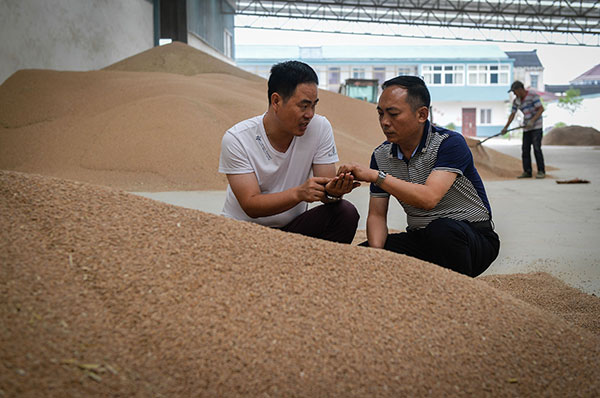Summer crop yield set to decline
Updated: 2016-06-29 08:37
By Xu Wei(China Daily)
|
|||||||||
China's summer crop yield is set to drop for the first time in six years as a result of a reduction in acreage, unfavorable weather conditions and adjustments in the crop structure, according to analysts.
The country's total crop harvest this summer is estimated at 121.8 million metric tons, according to a report by the CropWatch research team, the country's leading crop monitoring system.
The drop in yield is mainly the result of a 1.8 percent decrease in summer crop acreage in 2015, with a large number of rapeseed farmers opting to rotate their crop or switch to wheat as a result of sluggish domestic prices.
It also comes as the country's agricultural authorities push supply-side reforms to cope with a massive surplus in the country's grain reserves, estimated to be about 600 million metric tons as of May.
The CropWatch team is part of the Institute of Remote Sensing and Digital Earth under the Chinese Academy of Sciences. It assesses national and global crop production using remote sensing and ground-based indicators.
China's summer crops are mainly wheat, corn, barley, broadbeans and peas.
The decrease in acreage was most significant in Jiangsu province, where the summer crop planting fell 8.6 percent from the previous year, according to CropWatch.
However, the fact that many farmers switched from rapeseeds to wheat has helped increase per-unit yield, and thus helped mitigate the impact of the acreage decrease.
Cao Hui, a senior researcher at the Ministry' of Agriculture's Research Center for Rural Economy, predicted that the country's wheat production would decrease this year for the first time in 12 years.
Today's Top News
Labour's Jeremy Corbyn loeses no-confidence vote
Germany, France, Italy urge Britain not to waste time in divorcing EU
Britain urged not to waste time in divorcing EU
Americans, Chinese look to UK for travel bargains
Turkey's Erdogan apologizes to Putin
UK opposition leader Corbyn says will not resign
10 hurt in rollercoaster accident in central Scotland
Vote poses China-UK trade ties challenge
Hot Topics
Lunar probe , China growth forecasts, Emission rules get tougher, China seen through 'colored lens', International board,
Editor's Picks

|

|

|

|

|

|








